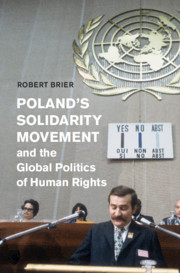Book contents
- Poland’s Solidarity Movement and the Global Politics of Human Rights
- Human Rights in History
- Poland’s Solidarity Movement and the Global Politics of Human Rights
- Copyright page
- Dedication
- Contents
- Acknowledgments
- Note on Geographical Regions
- Note on Cited Primary Documents
- Abbreviations
- Introduction
- 1 The Rise of Dissent in Poland
- 2 Dissent and the Politics of Human Rights
- 3 The Principle of Noninterference as Laid Down in the Helsinki Final Act
- 4 The End of the Ideological Age
- 5 Solidarity, Human Rights, and Anti-Totalitarianism in France
- 6 The “Bedrock of Human Rights”
- 7 Letters from Prison
- 8 Lech Wałęsa, the Symbolism of the Nobel Peace Prize, and Global Human Rights Culture
- 9 General Pinochecki
- 10 Human Rights and the End of the Cold War
- Epilogue
- Bibliography
- Index
- Poland’s Solidarity Movement and the Global Politics of Human Rights
- Human Rights in History
- Poland’s Solidarity Movement and the Global Politics of Human Rights
- Copyright page
- Dedication
- Contents
- Acknowledgments
- Note on Geographical Regions
- Note on Cited Primary Documents
- Abbreviations
- Introduction
- 1 The Rise of Dissent in Poland
- 2 Dissent and the Politics of Human Rights
- 3 The Principle of Noninterference as Laid Down in the Helsinki Final Act
- 4 The End of the Ideological Age
- 5 Solidarity, Human Rights, and Anti-Totalitarianism in France
- 6 The “Bedrock of Human Rights”
- 7 Letters from Prison
- 8 Lech Wałęsa, the Symbolism of the Nobel Peace Prize, and Global Human Rights Culture
- 9 General Pinochecki
- 10 Human Rights and the End of the Cold War
- Epilogue
- Bibliography
- Index
Summary
This chapter discusses how the book's main themes relate to the historiography of human rights. It makes four points: First, it argues that the history of the Solidarity movement shows how precarious and contested human rights remained in international politics well into the 1980s, a finding that challenges the view of the 1970s as the final breakthrough of human rights. Second, this chapter argues that the history of Polish dissent and of its supporters in France and the USA reveals discourses in which human rights were not seen as an alternative to politics so much as a means of creating a new kind of politics. Even the overtly antipolitical imagery of groups like Amnesty International merely concealed a profound symbolic politics of human rights. Third, the findings of the book do not suggest that the origins of human rights really lie in the 1980s but that the entire quest for a point of origin is misguided. The history of human rights, rather, is one of their continuous competitions with other universalisms, their repeated reinvention, and adaptation to new causes. Fourth, this chapter argues that the book's findings show that human rights had a crucial impact on the end of the Cold War.
Keywords
- Type
- Chapter
- Information
- Publisher: Cambridge University PressPrint publication year: 2021

